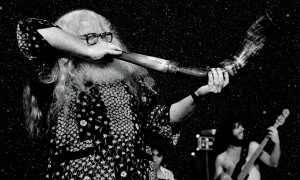Home » Jazz Articles » From the Inside Out » Postcards From Seven Summer Day Trips
Postcards From Seven Summer Day Trips
The blues is a curse and the blues is a blessing. No one person embodied that truth more than guitarist and vocalist Hound Dog Taylor.
 Vernon Reid & Masque
Vernon Reid & Masque
Known Unknown
(Favored Nations)
Reid, who packed funk and rock guitar for Living Colour, here serves as ringmaster for bassist Hank Schroy, keyboardist Leon Gruenbaum and drummer Marlon Browden (formerly with John Scofield). In the center of this colorful, flying electric circus, Reid's guitar howls and growls like a magnificent, fearsome beast.
Reid especially roars through the blues-based "Time," at slow blues tempo, and faster through his quick whipping of "The Slouch," while "Down and Out in Kigali and Freetown" crackles and pulsates with a dangerous-sounding jungle beat.
Points of jazz interest include the nimble ensemble dash through "Outskirts" and two of what Reid calls "fractured standards," frenetic covers of Lee Morgan's "The Sidewinder" and Thelonious Monk's "Brilliant Corners." Reid's solo in "Corners" wildly scratches like a death row inmate clawing desperately at the dirt to escape from lockdown; Gruenbaum's piano solo scrambles but keeps pace with its frantic tempo. Twice as fast, this updated and electric "Sidewinder" sounds more like a roadrunner but still packs plenty of bite.
Sort of hoped that DJ Logic might have rocked a little more loopy and funky as he twists and turntables a guest spot in "Voodoo Pimp Stroll." (Reid and Logic teamed to release Front End Lifter as the Yohimbe Brothers in 1992.)
 The Motet
The Motet
Music For Life
(Harmonized)
Remember the band Stuff? Session aces who could play anything - jazz, rock, funk, pop, blues, soul, any thing - and occasionally got together to play their own stuff instead of always working on someone else's records. If you were fond of that Stuff, you'll love Motet's stuff.
Drummer Dave Watts thumps the Motet's heartbeat, composing most of their material and leading the rest of the group - Mark Donvan (guitar), Garrett Sayers (bass), Dominic Lalli (tenor sax), Greg Raymond (keyboards), and Scott Messersmith (percussion), here with Jon Stewart's guest alto sax - from their homebase of Boulder, CO, a jam band hotbed.
That's one way to hear this Music if you don't know Stuff: As the reincarnation of the group Chicago as a jam band (with horn charts as tight and punchy as a left hook thrown in the clinch) or as naked Steely Dan instrumental tracks awaiting their exquisite wordplay. "Cheap Shit" cooks up tender and tasty instrumental funk. "Power" is more like jazz, horns and keyboards tossing its melody back and forth atop the waves of its Latin rhythm, saxophone solo riding the percussion / bass break bareback and easy. The deft "Black Hat" puts on modern hard bop, saxophone honking out sweaty barroom emotion and Donvan's guitar solo all George Benson cool, soft and blue as it snuggles deeply into the beat.
This is great for cruising open highway. And it's a pleasant enough trip...but there's just not an awful lot of excitement once you arrive.
 Duke Ellington
Duke Ellington
Blues in Orbit
(Columbia/Legacy)
Sometimes it's nice to veer from familiar paths. But sometimes it's nice to revisit hallowed ground, too, and Duke Ellington is musical ground that's seriously hallowed.
Eleven tracks from the original 1960 release are supplemented with six tracks from these sessions that previously appeared elsewhere, plus a previously unreleased take of its title track. Credited to Ellington "and his award winners," this IS one hell of an Ellington band, featuring one of his best ever trumpet sections (Cat Anderson, Clark Terry, Shorty Baker and Ray Nance, who doubles on violin), and masterjamming such pillars of Ellingtonia as "In a Mellow Tone" and the riotous "C Jam Blues." Longtime Ellington collaborator Billy Strayhorn, on piano, leads the band through "Blues in Blueprint" and the amazing ensemble workout "Smada."
These ain't no sad and mopey blues. Sure, they're sometimes reflective, even pensive, but they are primarily, joyously swingin'. Bassist Jimmy Woode rocks as solid as Gibraltar, his walking lines in "Pie Eye's Blues" and "The Swingers' Jump" booting the trumpet and clarinet soloists respectively down the line. The opening dustup "Three J's Blues" spotlights three of the band's most sparkling Jimmys: Woode, drummer Johnson, and tenor saxman Hamilton.
There ARE s-l-o-w blues: "Sweet & Pungent" ambles slow and sweet as thick molasses, and "The Swingers Get the Blues, Too" pulsates with a trombone solo that's stately and powerful.
Ron Levy's Wild Kingdom
After Midnight Grooves
(Levtron.com)
Found the coolest funky little place. Chic, nicely arranged and built, hip and happenin'. No one thing in particular really stands out, but the way the whole thing casually, coolly grooves together is just so fine and mellow.
"Just the Way It Went" will keep bumpin' around the inside of my head the rest of the fall. It is just so : Adrome "Acidman" MacHine on drums and Levy on bass set up a taffy pull in the rhythm section (drums thump out the backbeat, then bass snaps it back), Levy's vibes coolly lead the ensemble through the melody with sophisticated funk, and the saxophone and guitar solos seem to glide above yet churn below, down in the rhythmic pocket.
The joint is composed, arranged, programmed, and produced by Ron Levy, who primarily plays keyboards (acoustic and electric piano, organ, clavinet, synthetic strings) plus bass and vibes. His tunes and arrangements maximize the contributions of guest saxophonists "Sax" Gordon Beadle and Karl Denson and the consistently dazzling guitarist Melvin Sparks, who hammers home the groove in "Just the Way It Went" till it becomes transcendent.
As a keyboardist, Levy lays down cool pastel tiles for the soloists to dance on and deep liquid blue pools for them to swim in. In the sticky thick New Orleans syncopated funk groove "Slinky" he tosses off a straight-up Les McCann piano solo - somehow gospel sanctified yet cathouse bawdy and blue, cold steady rocking.
 Hound Dog Taylor and the Houserockers
Hound Dog Taylor and the Houserockers
Release the Hound
(Alligator)
The blues is a curse and the blues is a blessing. No one person embodied that truth more than guitarist and vocalist Hound Dog Taylor. He had the rare blues gift that made feeling so bad feel so good.
Bruce Iglauer founded Alligator Records in 1971 to record Hound Dog's unique incendiary blues, forged with guitarist Brewer Phillips and drummer Levi Warren (later Ted Harvey). This collection of previously unreleased (mostly live) material includes three tracks from the Houserockers' first US tour that same year, soundboard recordings of "She's Gone," "It Hurts Me Too" and "The Dog Meets the Wolf," Taylor's tribute to another Chicago legend, Howlin' Wolf.
Taylor's tortured guitar and vocal in "It Hurts Me Too" projects such human agony it sounds like what it must feel like to have your body set on fire. It careens into a shotgun blast through "What'd I Say" that typifies why the Houserockers became known as "the Ramones of the blues": it's too loud, too fast, too unintelligible, too raw...and it's simply magnificent. In "One More Time," the next track, Taylor illuminates the path down which Chuck Berry discovered rock and roll in the blues.
Guitar with vocal blues just can't sound much more hurt and brokedown than Taylor's ten-minute confessional "Things Don't Work Out Right."
Hound Dog recorded three albums for Alligator before he died of lung cancer. "When I die," he once reflected, "they'll say, 'He couldn't play shit, but he sure made it sound good.'" He was half right: This sounds - and feels - mighty good.
 Joe Bonner
Joe Bonner
New Beginnings
(Evidence)
Enjoyed this morning's sunrise in a most quietly beautiful place. Sunlight poured down from above, tender and strong, setting off wondrous and dark shadows. A place where you can safely hear the wordless sound of your own heart.
Every one of these five originals, plus Bonner's rendition of Thad Jones' "A Child is Born," sounds like a love song. Even if they were not composed to be heard that way, in Bonner's hands they are lovingly rendered on acoustic piano and Fender Rhodes, mainly in solitude. Laurie Antonioli doubles up Bonner's "Soft Breezes" melody with beautiful wordless vocals; cello dances with piano through Bonner's title track.
Bonner attacks "Soft Breezes" with a guitarist's rhythmic touch, strumming with his left hand to voice each individual notes within chords, and contrasting the melody against repeated background ripples. Like much of this beautiful music, "Primal Scream" sounds both adventurous and therapeutic. So does the penetrating and explosive "The Revolution."
He sounds profoundly influenced by McCoy Tyner long before the last song, a tribute to Tyner's most famous employer, "Ode to Trane." This sounds so forthright and tender, at least the first two verses, you really could be listening to Burt Bacharach (its rhythmic and melodic flow seem to echo "Wives and Lovers").
Bonner has recorded and performed with Roy Haynes, Freddie Hubbard, and Billy Higgins, and has served as one of Pharoah Sanders' most sympathetic pianists. New Beginnings was originally released by Theresa Records in 1988. Its beauty is something of a curse: This set is way too brief (less than forty minutes) and because what you DO hear is so beautiful, you are left wanting to hear more.
 Bebel Gilberto
Bebel Gilberto
(Six Degrees)
What do you do after your debut ( Tanto Tempo ) is adored by critics AND sells a million worldwide copies? Make a second record that's even better.
Bebel Gilberto assumes this singer's rightful place in the direct line of Brazilian music royalty: Bebel is daughter to bossa nova founding father João Gilberto and stepdaughter to Astrud Gilberto, who breathed the timeless voice into "The Girl From Ipanema." Gilberto's wide-eyed wander through "Every Day You've Been Away" brings together two Brazilian musical dynasties, joining Gilberto with co-composer Daniel Jobim, grandson of Antonio Carlos.
Bebel proves an expert new interpreter of the classic Brazilian canon and weaver of her own intoxicating mystery and magic. "Aganjú" and "River Song" introduce modern Brazil to modern electronics, swelling then reducing the dynamic tension subtly and effectively. A real family affair, "Aganjú" was written by Bebel's cousin Carlinhos and features her mother Miucha on backing vocals.
There's a touch of Stevie Wonder soul from the harmonica in "Winter," and "After All" weaves soft threads from Sade and other island colors into the rhythm. ("I still believe that she (Sade) is the biggest influence I've ever had," Gilberto has confessed.)
But it's two ballads, co-written by the singer with producers Didi Gutman and Marius De Vries, that make Bebel so stunning: "Simplesmente" and the set's closer, "Next to You." Accompanying lyrics match the profound beauty of their simply built but no less gorgeous piano melodies, chords and of course vocals, opening "Next to You" with an autumn call to reflect upon this summer that was:
"So winter's come/ And summer's fall/ Time is just a whisper/ In a waterfall..."
< Previous
Rebecca Coupe Franks
Next >
Hard Bop Extravaganza
Comments
Tags
For the Love of Jazz
 All About Jazz has been a pillar of jazz since 1995, championing it as an art form and, more importantly, supporting the musicians who create it. Our enduring commitment has made "AAJ" one of the most culturally important websites of its kind, read by hundreds of thousands of fans, musicians and industry figures every month.
All About Jazz has been a pillar of jazz since 1995, championing it as an art form and, more importantly, supporting the musicians who create it. Our enduring commitment has made "AAJ" one of the most culturally important websites of its kind, read by hundreds of thousands of fans, musicians and industry figures every month.






















